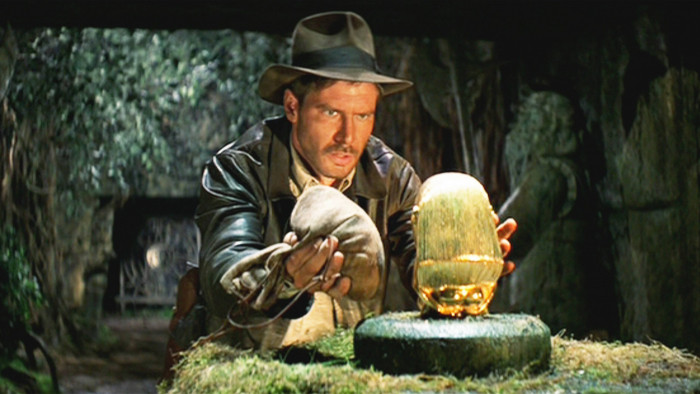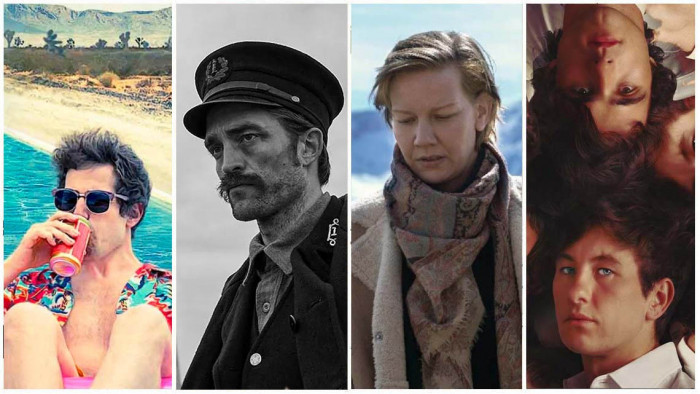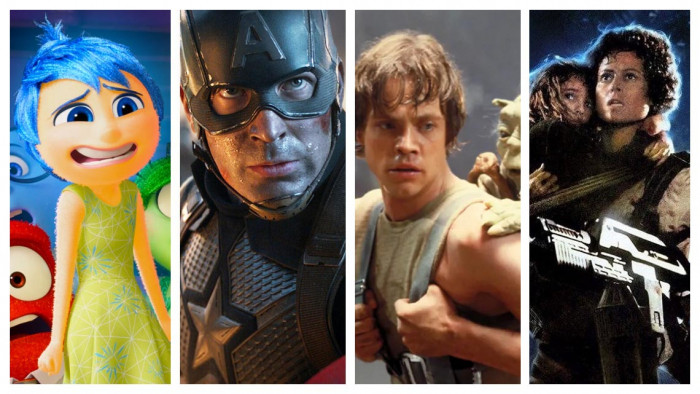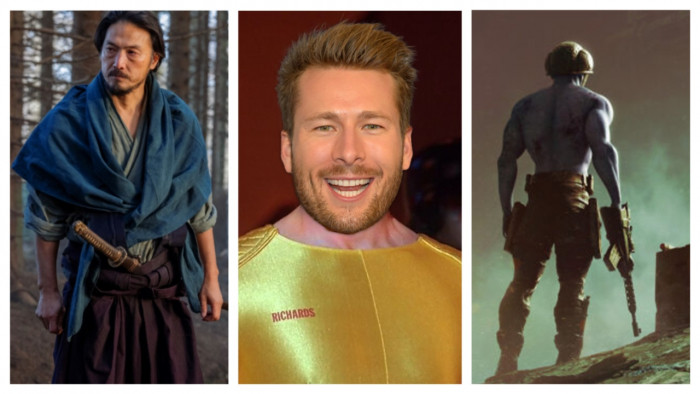“You’re not fit to play Spider-Man.” “Spider-Man can’t be English.” “Spider-Man can’t be 28…”
Andrew Garfield is listing some of the criticism he’s received since it was announced, two years ago, that he’d been chosen for the title role in The Amazing Spider-Man. It’s the kind of stick he no doubt expected from the dark recesses of the web (pun only partially intended), but this savagery, he claims, came from a far more personal source.
“My mum is on at me all the time,” he says. “She’s the biggest Spider-Man fan. She abuses me, she posts, she texts me anonymously, but I know it’s from her.”
A very jetlagged Garfield, who’s reclining on a sofa and nursing what appears to be a bucket of coffee, may not be completely serious.
Or maybe he is. When it comes to superheroes, people can take things very personally, which is why putting any comic book on the screen is fraught with risk; get it wrong and spleens will be vented. Still, it’s a risk film companies seem happy to take. There are many things that, according to received wisdom, you should never go back to: fireworks, the scene of a crime, the future. Yet it’s a maxim that doesn’t apply to comic-book adaptations. Alongside the inevitable sequels, there have been reimaginings, remakes, revisits, reworkings and other ‘re’ words that mean roughly the same thing.
New beginnings
The Amazing Spider-Man is, officially, a ‘reboot’, most likely because it’s turning the Spider-Man story off and turning it back on again. It shows the making of the superhero, in the same way the first Sam Raimi-Tobey Maguire film did in 2002, but tells things differently, going back earlier in Peter Parker’s life and accentuating the effect his parents’ deaths had on him.
It’s part of the filmmakers’ plan to create a deeper, more emotional and more realistic character. Until recently, superhero films touched on sensitive matters, but didn’t explore them, effectively becoming the cinematic equivalent of men. Then came Christopher Nolan with his brooding Batman – another hero tortured by early orphaning (and also played by a Brit, Christian Bale, although Garfield dismisses the idea of a British ‘invasion’ of Hollywood: “There have always been British actors making their mark in the States”).
Admittedly, Spider-Man’s brooding is more of the lock-himself-in-the-bedroom variety, but human frailty is an area he can exploit more than most Spandex warriors. He’s always been extremely relatable, the everyman superhero; he’s not a billionaire, he’s not an alien; he’s an awkward young man who just happens to be able to stick to ceilings.
Garfield has often professed his lifelong love of Spider-Man, seeing him as a role model for skinny kids – like he was – but it’s not just this affinity that landed him the role. The producers were looking for an actor who could give the required depth, but also meet the physical demands, meaning Garfield’s childhood gymnastic training helped swing things for him (again, pun only slightly intended). One of the film’s producers claims he was the only man for the job.
“Why Andrew Garfield?” asks Matt Tolmach, before answering himself. “Because he’s awesome. He’s one of the great actors of his generation. We auditioned a lot of guys, and there were many really good actors who threw their hats in the ring when we announced we were doing it. And it was a very simple thing in the end. We didn’t have a back-up. He was that good.”
It’s been a rapid rise for Garfield. Tooting our own trumpet, when ShortList put him on our cover in October 2010 and claimed that his face was “about to become very familiar”, we weren’t wrong. At that point, despite the fact that his Spider-Man appointment had been announced (and met with more than a few mumbles of “who?”), he was still best known for his Bafta-winning performance in TV drama Boy A. Then things began to rapidly change.
His role in the hugely successful The Social Network provided Garfield with more praise than if he actually was a superhero. People stopped asking “who?” and started getting excited about what this affable Englishman might bring to the job. Like one of his eight-legged friends cornered by a sadistic child, this new Spider-Man was now under the magnifying glass. So how is he handling it?
“Nothing’s that different,” he says. “I mean, talk to me later and maybe things will change, but right now I’m fine. I’m laughing. I’m able to pick my nose in public without fear of it being immortalised.”
Garfield is not alone in the spotlight. Parker’s love interest isn’t, as with the Sam Raimi-Tobey Maguire films, Mary Jane Watson. Instead it’s the lesser-known, but more intriguing, Gwen Stacy – police captain’s daughter and academic bright spark. Stacy is played by another soaring Hollywood talent, Emma Stone, whose own career highlights include receiving a Jonah Hill head-butt in Superbad and taming Ryan Gosling in Crazy, Stupid, Love.
Their chemistry on screen is evident, possibly because the romance spilled over into real life. That’s common. As is Hollywood’s use of older actors to play teenagers. However, eyebrows were still raised at Garfield, 28, and Stone, 23, playing a pair of 17-year-olds, and not just those of Mrs Garfield, though her son says he didn’t have any problems channelling his inner teen.
“I still feel like a teenager,” he says. “Obviously, I’m more happy and secure in myself than I was at that age, because I was not happy and secure. It’s a horrible period of life. It was for me, anyway. I found it tough. I wished I was born in a different body, I wished I didn’t have eczema – I had really bad eczema on my face. I was a short guy that grew late. And my ears were massive. It’s very difficult to forget about that period of your life, and very, very easy to remember. I still feel pretty close to it. And I still look 12.”
Garfield’s preparations weren’t all about regression. In order to be the best web-slinger he could be, he had to go through some serious physical work – six months of personal training, plus learning trampoline, basketball, skateboarding and martial-arts skills – which has left him looking noticeably bulkier than the last time we met.
“People who go to the gym that much, of their own accord, are insane,” he says. “I guess it can be addictive, the endorphins and the vanity of it, but I’m far too lazy and concerned about other things. But for the role, I wanted to be strong and to feel as close to Spider-Man as possible. It was important to me. I didn’t want to get too big – I wanted it to be a skinny kid beating the crap out of big guys, because it’s my pure fantasy fulfilment and that of every boy and Peter Parker. So we built a body that was like Bruce Lee’s, I guess: lean and muscular.”
Spidery? “Spidery, yeah. That’s the other thing: spiders are light. If you get a big muscle-bound guy in a suit he turns into a muscle-bound guy in a suit, not a spider-boy. That’s what I wanted.”
A fresh look
Not only is Spider-Man more human than most superheroes, so are his nemeses, with many a good man turned bad by getting too involved with a test tube. Such is the case with Dr Curt Connors (played by Rhys Ifans), a one-armed herpetologist and former partner of Parker’s father, who turns into a 9ft reptile called The Lizard. He’s one of the classic villains from 50 years of Spider-Man stories; a rich source, and one which has itself been ‘rebooted’ a number of times, especially in the comics. It was this history of mutation that gave the filmmakers licence to put a different spin (last one, promise!) on Spidey’s origin a mere 10 years after Maguire was first bitten.
This link to the comic books is essential. As mentioned, people take superheroes very personally, which puts an extraordinary amount of pressure on everyone involved.
“People are going to be scared, and angry, because it’s theirs,” says Garfield. “This character is theirs, it’s mine, it’s every fan’s. So if you don’t match up to exactly what they need, then they’re going to be p*ssed with you and I understand it. I’m p*ssed with me, because I want me to be different. I feel like I’m the guardian right now, the guardian for a symbol that is bigger than this movie, bigger than the Sam Raimi movies, bigger than every single comic.”
Precisely the reasons why any sane man would have doubts about taking the role – and Garfield is a sane man.
“Yeah, I had doubts, because who wants to f*ck that up? No one, especially not someone who cares about it. But also, you have to be brave, otherwise moments pass you by and you regret them. Failure is a terrifying thing, but if you fear failure and don’t try then you may as well lie down and wait for Grandpa Death. I worked really hard. I didn’t sleep. The fans can go a bit easier on me, they can throw softer stones."
Let’s just hope his mum likes it.
The Amazing Spider-Man is at cinemas nationwide now
(Image: All Star)
Latest
Related Reviews and Shortlists


The 10 best war movies of the 21st century









